


Chess News



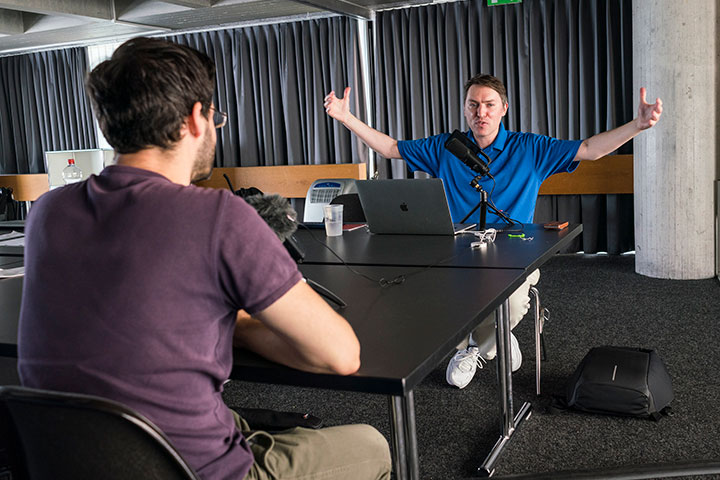

A Classical Guide to the French Defence
This DVD gives you the key to start out with the French Defence. GM Yannick Pelletier is a specialist of this opening, and believes that the most efficient way to understand its ideas, plans, and typical structures is to study classical lines.
Yannick is an accomplished player and commentator, who has been the Swiss Champion six times. Although he doesn't play more than a few tournaments a year nowadays, he has won three games from Magnus Carlsen, including one after Carlsen became World Champion. He is also a polyglot and soon-to-be art/design/lifestyle media entrepreneur. Check out his YouTube channel and new magazine project Yunomi. There will be a feature on Magnus Carlsen in the inaugural issue!
In the full 55-minute interview for Perpetual Chess (which you can listen to below), Yannick talks about life as a chess professional both before and after having kids, provides a history of the Biel Chess Festival plus gives the 101 on how the Swiss manage to get along so well despite having multiple official languages.
The Hedgehog - a universal system against 1.c4 and 1.Nf3
At first glance, the Hedgehog setup might appear somewhat passive but in fact Black is always waiting to launch a counterattack. Let Yannick Pelletier provide you with a complete repertoire against the English and the Reti!
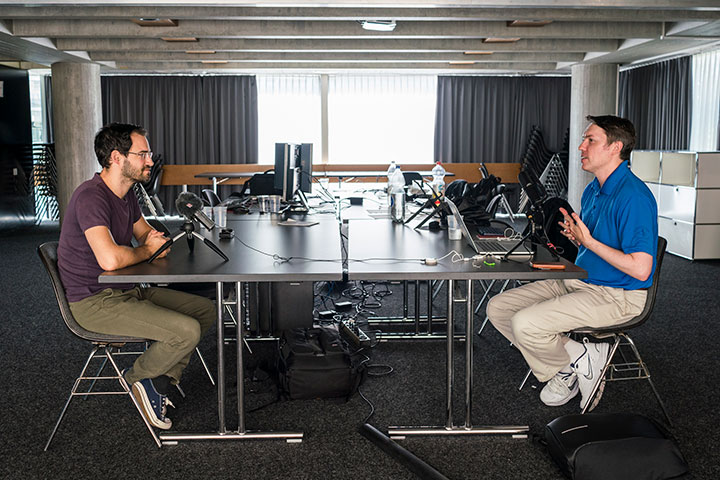
Pelletier speaking with Macauley Peterson in Biel on July 29th | Photo: Lennart Ootes
"I learned chess by chance, basically, when I was about 7. I was brought to the chess club in Biel quite quickly afterwards. The chess club used to be one of the most important chess clubs in Switzerland back then, in the beginning of the 80s, and it lasted until the [early 2000s]. Nowadays, the club still exists but not in the same strength as before — Biel has won the Swiss league team competition many times, when I was there, but also before that. The chess club was linked to the tradition of the festival as well — so they would interact, and people from the club would also work at the festival to make it possible — because the festival is 51 years old this year. Of course [Biel has] a long history with many great tournaments. Biel is clearly the main chess city in Switzerland together with Zurich.
The Vienna Variation - a reliable and ambitious weapon against 1.d4
The Vienna Variation is a particular and independent system of the Queen's Gambit. It arises after 1.d4 d5 2.c4 e6 3.Nf3 Nf6 4.Nc3 dxc4, when Black's capture on move 4 is strongly reminiscent of the Queen's Gambit Accepted.
Zurich dates back much longer because the chess club of Zurich is more than 200 years old — they celebrated their 200th anniversary in 2008 with a great tournament — and they’ve had great tournaments as well; [I will] just mention the Candidates tournament in 1953, but there are many more great events which have been played in this city.
 The [Biel Chess] club is, of course, a bit older [than the Festival], but never really been important except when the festival was along. Basically, the festival was a family story at the start. The first great year was 1976 — coincidentally the year I was born — [when] the interzonal tournament took place here with great names such as Larsen, Tal, Huebner and so on, who played there, so that’s basically the first year when Biel really appeared on the chess map as a major city. I think from 1977 they started staging a Grandmaster tournament. Before that, it would be just an Open, until the zonal in 1976. And then they had a GM tournament — not the same level as it is now but just a few big names and then a few locals and so on. The accent was not really set on the rating average back then. You just needed a few good names and then you had attention from the chess world and also from the press here in Biel.
The [Biel Chess] club is, of course, a bit older [than the Festival], but never really been important except when the festival was along. Basically, the festival was a family story at the start. The first great year was 1976 — coincidentally the year I was born — [when] the interzonal tournament took place here with great names such as Larsen, Tal, Huebner and so on, who played there, so that’s basically the first year when Biel really appeared on the chess map as a major city. I think from 1977 they started staging a Grandmaster tournament. Before that, it would be just an Open, until the zonal in 1976. And then they had a GM tournament — not the same level as it is now but just a few big names and then a few locals and so on. The accent was not really set on the rating average back then. You just needed a few good names and then you had attention from the chess world and also from the press here in Biel.
Biel is officially the only Swiss city which is bilingual — French and Swiss German. There are other cities where both languages are spoken, but the contrast is bigger. In Biel, it’s more or less 60% German, 30% French, and the rest are mixed. Basically, Switzerland copes with this language “problem” extremely well. In many countries in the world, there would already be wars and splitting. I mean, language is probably the most difficult hurdle (after religion) to overcome as a community, as a country, because you need communication. Communication is paramount if you want to live together well. Of course, people learn both languages at school — in theory at least — so that we can understand each other.
I’m a French-speaker, that’s my mother tongue — my father is from France and my mother is from Switzerland but a French speaker. But I learned German quite quickly at the chess club and at school. The fact that I learned the rules of German in school and could practise it at the chess club was a big help. But it’s not the case for everybody. Many people don’t really speak well — French speakers don’t really speak well German, not all of them. It’s a myth to believe that Swiss people all speak like three or four languages fluently. There are French-speaking schools and German-speaking schools. That’s especially the case in Biel — maybe not 50-50, but 60-40%. All my classes were done in French, except of course English class — then we learned English — and German class. Nowadays it exists, you can have classrooms where the classes are mixed — one class in French and the next in German. It’s quite recent.
When you’re a French-speaking kid you spend time with French-speaking kids…so it’s not like you can easily learn the other language. So in that sense, I think we’re doing really well, that Switzerland is very stable still. Of course, the economic situation helps — it’s very stable, and Switzerland is a rich country and there is no real problems for people, socially-wise. We are doing well".
"We are weaker chess players! We are a smaller country of course, but I think the best to compare the dynamic is comparing with Italy. I remember we played against Italy in the Olympiads in 2000 and we were clear favourite — I mean we had [Victor] Korchnoi playing on board one and then we had [Joe] Gallagher — I was not yet a GM — but we beat Italy quite normally — I mean we didn’t crush them but it was just a normal match and nobody was shocked in Italy or Switzerland. It was just normal. The development of Italy in the past few years — and I’m not speaking of Fabiano Caruana — but just young players who learned chess at school or wherever and they’ve become really strong. [Daniel] Vocaturo, [Sabino] Brunello, you name it, you have like five or six very young GMs now who are very strong and can become even stronger. And we don’t have this tendency in Switzerland. OK, we have Nico Georgiadis, we have Noel Studer, but they are all in the range of about 2500, maybe 2530, while these Italians they are already 2600.
It’s very difficult to explain the reasons. It’s been a tendency in the whole world almost that chess players become strong at a younger age and they start learning chess thanks to computers, and Internet and so on. In Switzerland this tendency doesn’t seem to exist. I always tend to joke that in Switzerland inflation is very low, and that counts also for [Elo] rating, unfortunately. There is an inflation in rating as well, if you compare it with 20 years ago, but Switzerland doesn’t seem to be affected by this, unfortunately.
 I don’t really know why. One of the reasons is that making a living in Switzerland as a chess player is very difficult. Salaries are extremely high, the cost of living is very high, and so on, so if you have a normal job you get a “normal” salary, according to the cost of living in Switzerland…as a chess player you need to struggle; you go and play a match in the Bundesliga and you get the exact same fee as a GM from Ukraine, except that this GM from Ukraine can live a month with that fee and you can live two days, so of course this very high cost of living makes it very difficult for chess players to live from their passion, and it affects also young players. They say, ‘OK chess is nice, I’m going to play a bit, but I’m never going to invest too much time in it. I like it so I’m going to do it, I have some free time, but that’s it. I have to study, I have to finish my university’ and then OK it’s already too late to become a very strong chess player.
I don’t really know why. One of the reasons is that making a living in Switzerland as a chess player is very difficult. Salaries are extremely high, the cost of living is very high, and so on, so if you have a normal job you get a “normal” salary, according to the cost of living in Switzerland…as a chess player you need to struggle; you go and play a match in the Bundesliga and you get the exact same fee as a GM from Ukraine, except that this GM from Ukraine can live a month with that fee and you can live two days, so of course this very high cost of living makes it very difficult for chess players to live from their passion, and it affects also young players. They say, ‘OK chess is nice, I’m going to play a bit, but I’m never going to invest too much time in it. I like it so I’m going to do it, I have some free time, but that’s it. I have to study, I have to finish my university’ and then OK it’s already too late to become a very strong chess player.
I completed my high school here in Biel, that was at age 20 — at the time that was normal, you finished between 19 and 20, so it’s already pretty late before going to university at 20 or 21. So I finished that, completing my high school degree and then I decided to try and be a chess professional. I was a good IM at the time and I became a GM within a few years. I’d given myself two years to try it and I liked it, and I did develop well as a chess player in these two years. Then I had this setback a little bit for one or two years when I didn’t progress, and then I exploded — I got the GM title and I raced to 26-something rating for my peak rating in 2003. At that time I was just a chess player and nothing else. I wouldn’t give lessons or very very rarely. Just sometimes make a few analysis for magazines but just normal stuff.
I was a full-time chess professional and I lived in Switzerland until 2007 in Biel, and then I moved to France — not for economic reasons — to the south, Montpellier — and of course, the cost of living difference was huge. So from being with a “normal” income as a chess player in Switzerland, where I was doing OK, I became quite “rich” in France. So now I live with my family in Luxembourg , where my wife is from. That’s already a bit more expensive than France, but not as much as Switzerland.
There is this misunderstanding that I left Switzerland so that I could still be a chess professional, and that’s not the case, that was not the reason".
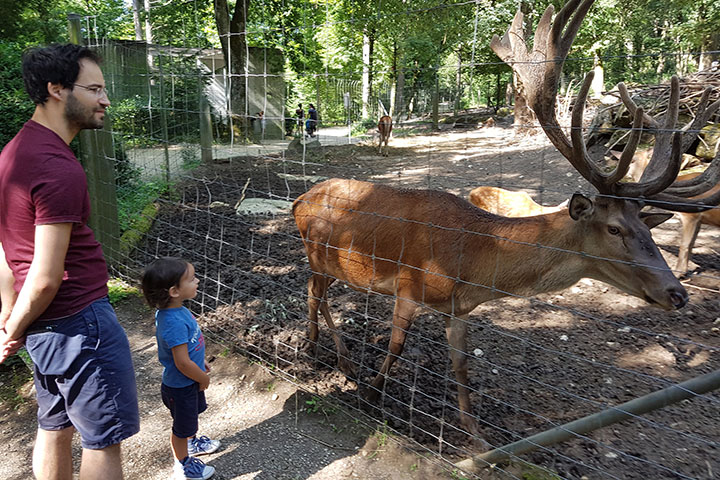
Yannick with his older son at a local nature park just outside Biel | Photo: Macauley Peterson
"Having a family, having kids is the nicest thing which I can have. I mean I enjoyed living alone before when I was a chess player, but it’s clear that in the long run, it’s not what I was planning for my life. But then it was all just natural, it just became very natural. And of course it requires organisation and decision, important decisions in our family life, and of course chess-wise my peak was already behind. I remained around 2600, top 100 in the world for two or three years. I was still around 2600 for around a decade, although — inflation again — the top 100 moved up in the ratings. But of course it was clear I would never be a top ten player or something like this so it was indeed time to be thinking about not just playing, but doing other things, like coaching — and it’s become very popular to be a commentator during events, and even some people who don’t have, let's say, any real chess background can make commentary nowadays. So, with all the live broadcast and the Internet, YouTube and so on it’s very easy to make commentary. I became a commentator as well in several events. I also stepped in here in the organising committee of Biel since 2013 following the tragic death of [Olivier Breisacher]".
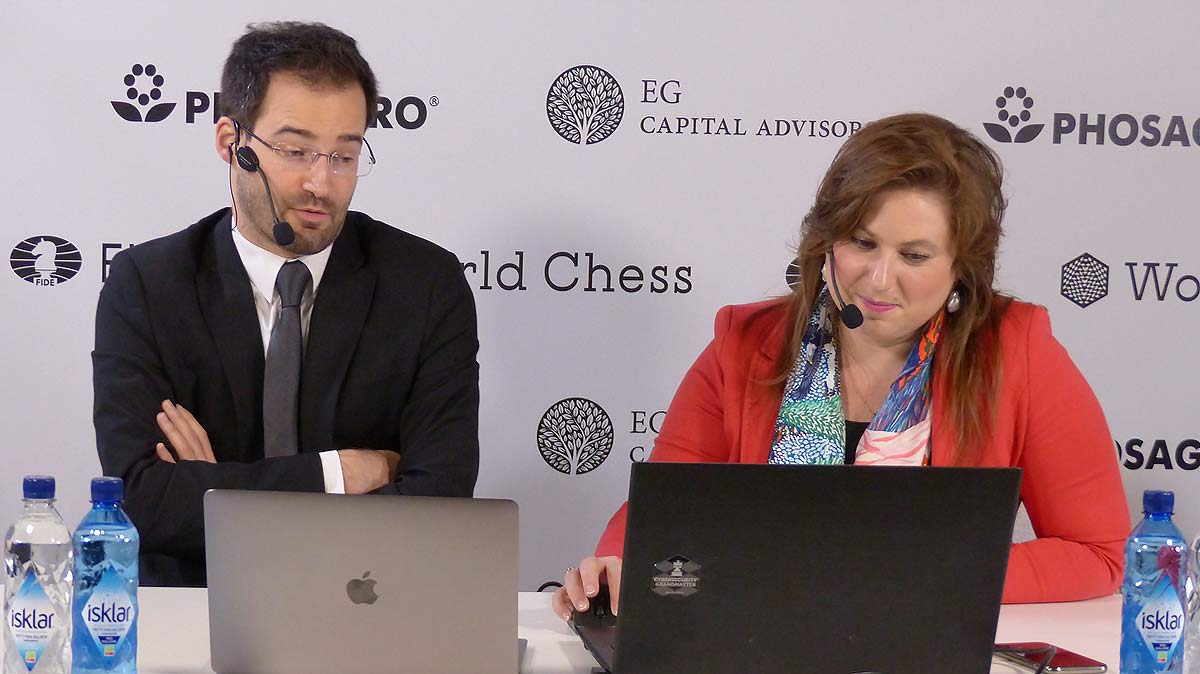
Yannick Pelletier commentating with Judit Polgar at the 2018 Candidates tournament | Photo: Frederic Friedel
"To combine with a family life, it’s a process which is more or less natural also, going together with time nowadays, how time changed. It’s true that I can do many more things chess-related from home, which is very good when you have kids, but also challenging in a way. That’s perhaps something we’ll talk about later. But of course, I play less. I still play a few tournaments per year — what I call the major tournaments from my point of view — the Swiss Championship, the Olympiad with the Swiss team and a few things. But basically it has to be interesting, it has to be challenging from a chess point of view, but it also has to be financially rewarding, otherwise, it’s a waste of time. I cannot afford to tell myself and my family, ‘now I’m going to play this open, and let's see if I win and bring back some money home’ — now that’s not possible anymore. So the time has to be well used and that’s how it is, and that’s actually very normal because the time I have I want also to spend a lot with my family.
It’s quite challenging indeed, and it’s not just for chess players, but for independent people who work at home or from home to combine work and family life is demanding because you might have kids around all the time on some days at least and you still have to work. You can’t just say, 'OK now I’m going to my office form 8 to 6 and I’ll be back later for dinner'.
I try to be as professional as possible, but still when I’m away from family, I’m missing my kids, my wife, so it’s obviously these two sides — of course, you have to work, you have to do it as well as possible, but then you’re happy to go home, to see your kids, to see your family".
"I beat him three times. I beat him in his first appearance here in 2005, actually in 15 moves, when he overlooked something and lost a piece in the opening. I beat him in 2007 when he won the event. He started with 5 or 5½ out of six and then he lost to me and to [Loek] van Wely and he had to win the last round to tie. And he won it and then he won the tiebreak against [Alexander] Onischuk. Of course, he beat me more often of course. The one you’re probably thinking of was the European Team Championship in 2015 in Reykjavik — well that was the only time we played against each other with Carlsen as the World Champion. And I was lucky enough to win it".
"After the game he was friendly — [in] the game, he was White and he was pushing a bit, I was a bit low on time, he had his typical endgame grip and I managed to defend well, and after time trouble as well, and suddenly he overlooked something and he lost a piece in the endgame. That’s pretty lethal normally. We talked a little bit in the evening, it was before the free day, we were in the hotel, and we chatted as well [about coming to Biel]".
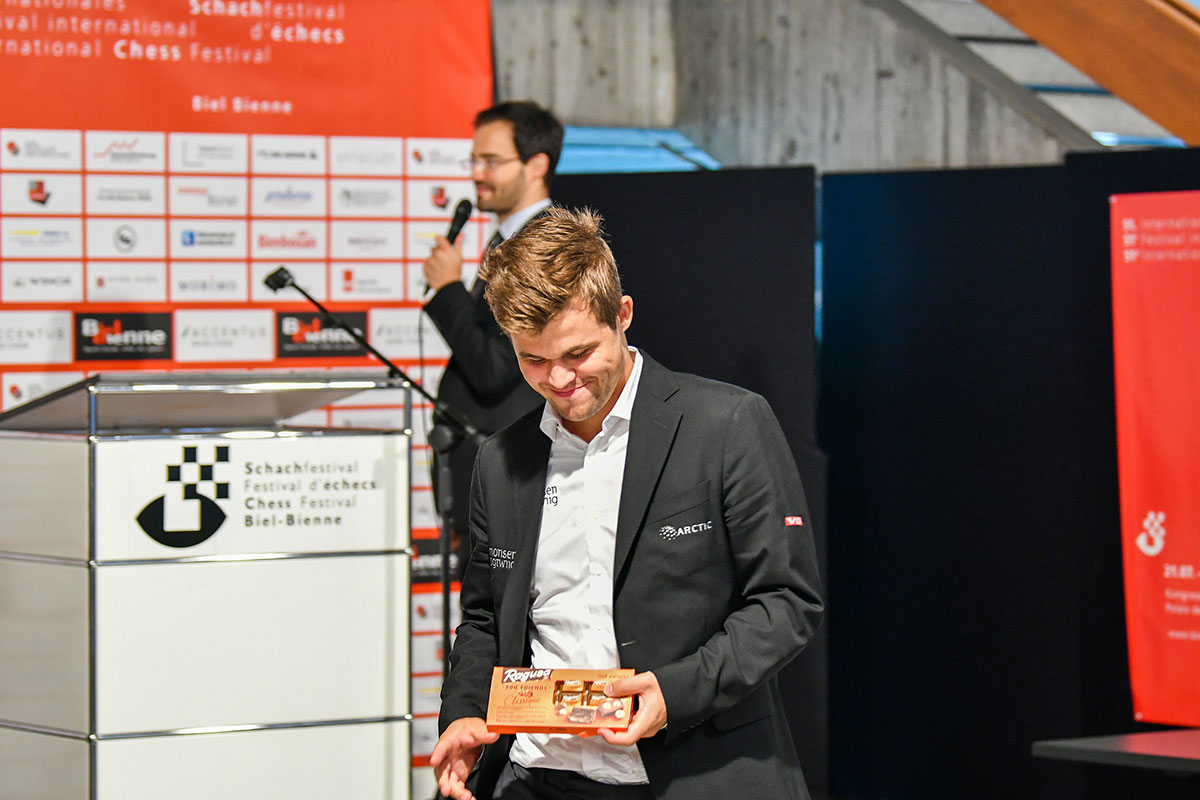
Maybe it's the Swiss chocolate that lures Magnus back to Biel | Photo: Lennart Ootes
The team was selected following the Swiss Championship where the fifth spot was decided.
"The first four were quite clear — Sebastian Bogner is number one, he’s around 2600 and he won the Championship — he just crushed the field, me included, so I’m going to be number two, Nico Georgiadis number three, Noel Studer is going to be number four and they’ve selected Florian Jenni as number five. He has played well in the Swiss Championship finishing third, and he’s making a comeback. He had quit chess for a number of years, starting from 2009 or something, so he’s made this comeback — he’s not as strong as before but he has this good understanding in general. We have a decent team, but not to tack the strongest teams in the Olympiad of course. We have this quite young team…Sebastian is 26 and Georgias and Studer are 22. OK, Florian is a bit older like me — he’s not as old as me, I’m the senior, the Deacon — it had to happen at some point".
The full hour-long conversation is available via Perpetual Chess: